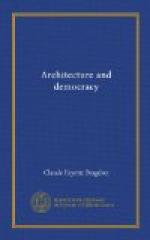The grandeur of Rome, the splendour of Paris—what just and adequate expression do they give of modern American life? Then shall we find in our great hotels, say, such expression? Truly they represent, in the phrase of Henry James, “a realized ideal” and a study of them should reveal that ideal. From such a study we can only conclude that it is life without effort or responsibility, with every physical need luxuriously gratified. But these hotels nevertheless represent democracy, it may be urged, for the reason that every one may there buy board and lodging and mercenary service if he has the price. The exceeding greatness of that price, however, makes of it a badge of nobility which converts these democratic hostelries into feudal castles, more inaccessible to the Long Denied than as though entered by a drawbridge and surrounded by a moat.
We need not even glance at the churches, for the tides of our spiritual life flow no longer in full volume through their portals; neither may the colleges long detain us, for architecturally considered they give forth a confusion of tongues which has its analogue in the confusion of ideas in the collective academic head.
Is our search for some sign of democracy ended, and is it vain? No, democracy exists in the secret heart of the people, all the people, but it is a thing so new, so strange, so secret and sacred—the ideal of brotherhood—that it is unmanifest yet in time and space. It is a thing born not with the Declaration of Independence, but only yesterday, with the call to a new crusade. The National Army is its cradle, and it is nurtured wherever communities unite to serve the sacred cause. Although menaced by the bloody sword of Imperialism in Europe, it perhaps stands in no less danger from the secret poison of graft and greed and treachery here at home. But it is a spiritual birth, and therefore it cannot perish, but will live to write itself on space in terms of beauty such as the world has never known.
II
DURING THE WAR
The best thing that can be said about our immediate architectural past is that it is past, for it has contributed little of value to an architecture of democracy. During that neo-feudal period the architect prospered, having his place at the baronial table; but now poor Tom’s a-cold on a war-swept heath, with food only for reflection. This is but natural; the architect, in so far as he is an artist, is a purveyor of beauty; and the abnormal conditions inevitable to a state of war are devastating to so feminine and tender a thing, even though war be the very soil from which new beauty springs. With Mars in mid-heaven how afflicted is the horoscope of all artists! The skilled hand of the musician is put to coarser uses; the eye that learned its lessons from the sunset must learn the trick of making invisible warships and great guns. Let the architect serve the war-god likewise, in any capacity that offers, confident that this troubling of the waters will bring about a new precipitation; that once the war is over, men will turn from those “old, unhappy, far-off things” to pastures beautiful and new.




